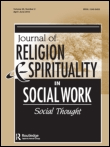
JOURNAL OF RELIGION AND SPIRITUALITY IN SOCIAL WORK
Scope & Guideline
Exploring the Sacred Connections in Social Work
Introduction
Aims and Scopes
- Integration of Faith and Social Work Practices:
The journal emphasizes the importance of incorporating religious and spiritual dimensions into social work practice, examining how these elements influence service delivery and client interactions. - Cultural and Spiritual Diversity in Social Work:
It addresses the diverse religious beliefs and spiritual practices of clients, aiming to enhance cultural competence among social workers by understanding various faith traditions. - Research on Religion and Social Justice:
The journal explores the role of religious organizations and beliefs in promoting social justice, particularly in addressing systemic issues such as poverty, discrimination, and violence. - Impact of Spirituality on Mental Health and Well-being:
Research articles frequently investigate the connections between spirituality, mental health, and well-being, highlighting the therapeutic potential of spiritual practices in social work. - Ethical Considerations in Religion and Social Work:
The journal discusses the ethical implications of integrating faith into social work, focusing on the responsibilities of practitioners in respecting client autonomy and diversity.
Trending and Emerging
- Ecospirituality and Environmental Justice:
There is a growing interest in ecospirituality, particularly in how interconnectedness and spiritual approaches can contribute to environmental justice and sustainability within social work. - LGBTQ+ Perspectives and Faith:
Recent studies are increasingly focusing on the intersection of LGBTQ+ identities and religious beliefs, exploring how faith shapes experiences of acceptance and identity within marginalized communities. - Trauma-Informed Spiritual Care:
Emerging research highlights the need for trauma-informed approaches to spirituality, particularly in supporting clients who have experienced trauma, such as domestic violence or natural disasters. - Impact of COVID-19 on Spiritual Well-being:
The journal has seen a rise in articles addressing the implications of the COVID-19 pandemic on spiritual well-being, mental health, and the role of faith in coping with crises. - Interfaith Dialogue and Collaboration:
There is an increasing trend toward exploring interfaith dialogue and collaboration in social work, emphasizing the importance of understanding diverse spiritual perspectives in community service.
Declining or Waning
- Traditional Religious Frameworks:
There is a noticeable decline in articles focusing on traditional religious frameworks, such as Christianity or Judaism, in favor of more inclusive discussions that encompass a wider array of spiritual practices and belief systems. - Exclusively Theoretical Approaches:
Papers that solely focus on theoretical discussions without practical implications or applications in social work practice are becoming less common, as there is a growing demand for empirical research and actionable insights. - Focus on Historical Contexts:
Research that primarily examines historical perspectives of religion in social work is waning, with a shift toward contemporary issues and current practices that address immediate social challenges.
Similar Journals

International Journal of Childrens Spirituality
Illuminating the Path of Spirituality in ChildhoodThe International Journal of Childrens Spirituality is a leading academic forum dedicated to the exploration of spiritual development in children, bridging the disciplines of psychology, education, philosophy, and religious studies. Published by ROUTLEDGE JOURNALS, TAYLOR & FRANCIS LTD, this journal has gained notable recognition with its quartile rankings in Q3 for Developmental and Educational Psychology, Q2 in Education, and esteemed Q1 positions in both Philosophy and Religious Studies for 2023. Spanning from 1996 to 2024, the journal aims to foster interdisciplinary dialogue and contribute to the understanding of spirituality's role in childhood development. Scholars benefit from its rigorous peer-review process and its presence in prominent academic indices, which ensures high visibility and impact within the research community. Dedicated to nurturing both theoretical and practical insights, the journal serves as an essential resource for researchers, educators, and practitioners invested in the spiritual dimensions of child development and education.

Journal of Evidence-Based Social Work
Exploring the intersection of evidence and social justice.The Journal of Evidence-Based Social Work, published by Taylor & Francis Inc, is an essential resource for scholars and practitioners in the fields of social work, sociology, and psychology. Since its inception in 2019, this journal has made significant strides in promoting evidence-based practices through rigorous research and comprehensive analyses. With an impressive impact factor placing it in the Q2 category for Health (social science) and Sociology and Political Science, this journal serves as a vital platform for disseminating innovative research that informs policy and practice. The journal's commitment to quality is reflected in its Scopus rankings, with notable standings in both Sociology and Health (social science). While it operates under a traditional access model, it remains dedicated to advancing the field through its publications, making a profound impact on how social work is understood and practiced. Researchers, professionals, and students alike will find in this journal a wealth of knowledge and insights that are critical to the ongoing evolution of social science disciplines.

JOURNAL OF RELIGION & HEALTH
Illuminating the Impact of Spirituality on Health OutcomesJournal of Religion & Health, published by Springer, is a leading interdisciplinary journal that explores the intricate relationship between religion and health, shedding light on how spiritual beliefs and practices impact well-being. With an ISSN of 0022-4197 and E-ISSN 1573-6571, this esteemed journal seeks to bridge gaps between religious studies, medicine, and nursing, reflected in its impressive rankings, including Q2 in Medicine and Q1 in both Nursing and Religious Studies. With a converged publication history from 1961 to 2024, it stands at the forefront of scholarly discourse, emphasizing the importance of spirituality in health care. Although currently not offering open access, the journal provides valuable insights for researchers, practitioners, and students aiming to integrate spiritual considerations into health care settings. Its rigorous peer-review process ensures the publication of high-quality research that contributes to advancements in both academic and practical domains.
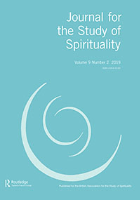
Journal for the Study of Spirituality
Bridging Tradition and Modernity in Spiritual StudiesJournal for the Study of Spirituality, published by Routledge Journals, Taylor & Francis Ltd, is a leading interdisciplinary journal dedicated to advancing research and dialogue in the field of spirituality. With an esteemed Q1 ranking in Religious Studies and a remarkable Scopus percentile of 96, this journal stands out as a critical resource for researchers, practitioners, and students alike, seeking to explore the complexities of spirituality within contemporary contexts. Its uninterrupted publication from 2015 to 2024 reflects a commitment to fostering innovative scholarship and providing a platform for new theories and practices in spirituality. While the journal operates under a traditional access model, it ensures a broad reach within the academic community through its rigorous review process and high visibility. Based in the United Kingdom, the journal epitomizes excellence in the arts and humanities, making significant contributions to the scholarly conversation on spirituality.
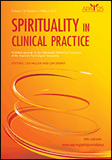
Spirituality in Clinical Practice
Integrating Spiritual Insights into Clinical PracticeSpirituality in Clinical Practice is a pioneering journal published by the Educational Publishing Foundation in collaboration with the American Psychological Association, dedicated to exploring the intersection of spirituality and mental health in clinical settings. With a significant focus on diverse therapeutic practices, this journal has established a notable presence since its inception in 2014, aiming to bridge traditional clinical methods with holistic approaches, thus enriching the understanding and treatment of mental health issues. As of 2023, it has achieved commendable rankings, holding Q3 in Clinical Psychology and Q2 in both Complementary and Alternative Medicine and Complementary and Manual Therapy, reflecting its impact and relevance in various interconnected fields. The journal encourages the sharing of innovative research and practical application of spiritual practices within clinical contexts, providing vital insights for professionals, researchers, and students alike. While currently not open access, articles strive to contribute significantly to the clinical community's knowledge base, aiming for continuous growth and exploration through its upcoming issues until 2024. For more information about submissions or access options, please visit the journal's website at www.spiritualityclinicalpractice.com.
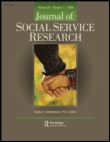
JOURNAL OF SOCIAL SERVICE RESEARCH
Uncovering transformative solutions for community challenges.JOURNAL OF SOCIAL SERVICE RESEARCH, published by Routledge Journals, Taylor & Francis Ltd, is a leading platform for disseminating cutting-edge research in the fields of social sciences, social work, and sociology. With a history spanning from 1978 to 2024, this journal serves as a vital resource for academics, practitioners, and students seeking to explore the complex dynamics of social services and their impact on communities. The journal holds a commendable reputation, ranking in the second quartile (Q2) in Social Sciences and Sociology and Political Science, and third quartile (Q3) in Social Work, reflecting its significant influence as evidenced by its percentile rankings in Scopus. While the journal does not offer open access, it is widely recognized for its rigorous peer-review process and commitment to advancing knowledge in social service practice and policy. As the landscape of social issues continues to evolve, JOURNAL OF SOCIAL SERVICE RESEARCH remains an essential conduit for innovative insights and empirical findings, fostering informed decision-making and scholarly debate.

Alternativas. Cuadernos de Trabajo Social
Driving Change through Open Access ResearchAlternativas. Cuadernos de Trabajo Social, published by Universidad de Alicante, serves as a vital platform for scholarly discourse in the fields of Social Sciences, Sociology, and Health, with a focus on emerging social welfare issues. This Open Access journal has been committed to disseminating vital research since 2010, allowing researchers, professionals, and students from around the globe to access invaluable insights into contemporary social challenges. Based in Spain, it has carved out its niche within the academic landscape, achieving Q4 rankings in Health (Social Science) and Q3 in both Social Sciences (Miscellaneous) and Sociology and Political Science for the year 2023. Although the journal's H-index remains undisclosed, its Scopus rankings indicate a growing presence within the academic community, particularly notable is its rank within the 31st percentile for Sociology and Political Science. As the journal continues to converge its efforts towards innovative social solutions from 2019 to 2024, it remains an essential resource for advancing knowledge and fostering informed debate within the critical sectors it addresses.
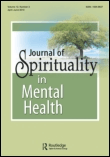
Journal of Spirituality in Mental Health
Advancing Understanding of Spirituality's Impact on Mental HealthThe Journal of Spirituality in Mental Health is a leading peer-reviewed publication dedicated to the exploration of the intricate relationships between spirituality and mental health. Published by Routledge Journals, Taylor & Francis Ltd, this journal provides a critical platform for researchers, practitioners, and scholars to disseminate innovative research findings, theoretical perspectives, and empirical studies. With an ISSN of 1934-9637 and an E-ISSN of 1934-9645, it serves an international audience and has established itself as a significant resource within its field. The journal has demonstrated its impact through a robust ranking within multiple categories, including Q1 in Religious Studies and Q2 in Social Sciences as of 2023. Maintaining a commitment to advancing knowledge, the journal encourages contributions that address both contemporary and traditional understandings of spirituality's role in mental health, making it an essential read for those engaged in applied psychology, social psychology, and beyond. Although it is not an Open Access journal, its scholarly articles are accessible through institutional subscriptions, ensuring a wide dissemination of knowledge. Spanning over a decade since its inception in 2007, the journal aims to continue fostering dialogue and research that bridges the gap between spirituality and psychological well-being.

PSYCHOTHERAPY
Illuminating Paths to Mental Wellness and RecoveryPsychotherapy is a prestigious journal published by the American Psychological Association, Division of Psychotherapy, dedicated to advancing the field of psychological practice and inquiry. With a solid foundation established since 1973, the journal encompasses a rich historical context while maintaining a forward-looking perspective through its convergence years extending to 2024. As evidenced by its commanding presence in the scientific community, Psychotherapy is ranked in the Q1 category for both Clinical Psychology and Psychiatry and Mental Health, reflecting its significant impact and contribution to the fields. The journal is indexed in Scopus, holding respectable ranks of #90/311 in Clinical Psychology and #217/567 in Psychiatry and Mental Health, showcasing its relevance and authority. Although not an open access publication, Psychotherapy remains an essential resource for researchers, clinicians, and students, providing cutting-edge research findings, innovative therapeutic techniques, and critical reviews that shape contemporary mental health practices. By disseminating high-quality theoretical and empirical studies, Psychotherapy plays a vital role in enhancing the understanding and efficacy of psychotherapeutic interventions.
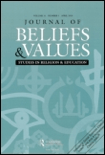
Journal of Beliefs & Values-Studies in Religion & Education
Transforming Understanding of Religious Influence in LearningThe Journal of Beliefs & Values - Studies in Religion & Education is a pivotal interdisciplinary publication that delves into the complex relationship between religious beliefs and educational practices. Published by Routledge Journals, Taylor & Francis Ltd, this esteemed journal offers a platform for rigorous research, insightful commentary, and in-depth analyses that contribute to the fields of both education and religious studies. Since its inception in 1984, the journal has grown to encompass a diverse range of topics, making significant contributions to the discourse around faith, values, and their influence on educational paradigms. With a commendable Q1 ranking in Religious Studies and a Q3 ranking in Education as of 2023, it hosts high-impact articles that are ranked in the top percentile of Scopus metrics. The journal is published in the UK and holds an important place for researchers, educators, and policymakers seeking to understand the interplay of religious beliefs and educational frameworks. By providing high-quality, scholarly articles, the Journal of Beliefs & Values continues to facilitate essential conversations that shape both academic inquiry and practical applications in educational settings.